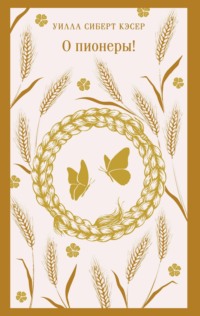
Полная версия
The Song of the Lark
"ACH, ICH HABE SIE VERLOREN, ALL' MEIN GLUCK IST NUN DAHIN."
Wunsch sang the aria with much feeling. It was evidently one that was very dear to him.
"NOCH EINMAL, alone, yourself." He played the introductory measures, then nodded at her vehemently, and she began:—
"ACH, ICH HABE SIE VERLOREN."
When she finished, Wunsch nodded again. "SCHON," he muttered as he finished the accompaniment softly. He dropped his hands on his knees and looked up at Thea. "That is very fine, eh? There is no such beautiful melody in the world. You can take the book for one week and learn something, to pass the time. It is good to know—always. EURIDICE, EU—RI—DI—CE, WEH DASS ICH AUF ERDEN BIN!" he sang softly, playing the melody with his right hand.
Thea, who was turning over the pages of the third act, stopped and scowled at a passage. The old German's blurred eyes watched her curiously.
"For what do you look so, IMMER?" puckering up his own face. "You see something a little difficult, may-be, and you make such a face like it was an enemy."
Thea laughed, disconcerted. "Well, difficult things are enemies, aren't they? When you have to get them?"
Wunsch lowered his head and threw it up as if he were butting something. "Not at all! By no means." He took the book from her and looked at it. "Yes, that is not so easy, there. This is an old book. They do not print it so now any more, I think. They leave it out, may-be. Only one woman could sing that good."
Thea looked at him in perplexity.
Wunsch went on. "It is written for alto, you see. A woman sings the part, and there was only one to sing that good in there. You understand? Only one!" He glanced at her quickly and lifted his red forefinger upright before her eyes.
Thea looked at the finger as if she were hypnotized. "Only one?" she asked breathlessly; her hands, hanging at her sides, were opening and shutting rapidly.
Wunsch nodded and still held up that compelling finger. When he dropped his hands, there was a look of satisfaction in his face.
"Was she very great?"
Wunsch nodded.
"Was she beautiful?"
"ABER GAR NICHT! Not at all. She was ugly; big mouth, big teeth, no figure, nothing at all," indicating a luxuriant bosom by sweeping his hands over his chest. "A pole, a post! But for the voice—ACH! She have something in there, behind the eyes," tapping his temples.
Thea followed all his gesticulations intently. "Was she German?"
"No, SPANISCH." He looked down and frowned for a moment. "ACH, I tell you, she look like the Frau Tellamantez, some-thing. Long face, long chin, and ugly al-so."
"Did she die a long while ago?"
"Die? I think not. I never hear, anyhow. I guess she is alive somewhere in the world; Paris, may-be. But old, of course. I hear her when I was a youth. She is too old to sing now any more."
"Was she the greatest singer you ever heard?"
Wunsch nodded gravely. "Quite so. She was the most—" he hunted for an English word, lifted his hand over his head and snapped his fingers noiselessly in the air, enunciating fiercely, "KUNST-LER-ISCH!" The word seemed to glitter in his uplifted hand, his voice was so full of emotion.
Wunsch rose from the stool and began to button his wadded jacket, preparing to return to his half-heated room in the loft. Thea regretfully put on her cloak and hood and set out for home.
When Wunsch looked for his score late that afternoon, he found that Thea had not forgotten to take it with her. He smiled his loose, sarcastic smile, and thoughtfully rubbed his stubbly chin with his red fingers. When Fritz came home in the early blue twilight the snow was flying faster, Mrs. Kohler was cooking HASENPFEFFER in the kitchen, and the professor was seated at the piano, playing the Gluck, which he knew by heart. Old Fritz took off his shoes quietly behind the stove and lay down on the lounge before his masterpiece, where the firelight was playing over the walls of Moscow. He listened, while the room grew darker and the windows duller. Wunsch always came back to the same thing:—
"ACH, ICH HABE SIE VERLOREN,...EURIDICE, EURIDICE!"
From time to time Fritz sighed softly. He, too, had lost a Euridice.
XI
One Saturday, late in June, Thea arrived early for her lesson. As she perched herself upon the piano stool,—a wobbly, old-fashioned thing that worked on a creaky screw,—she gave Wunsch a side glance, smiling. "You must not be cross to me to-day. This is my birthday."
"So?" he pointed to the keyboard.
After the lesson they went out to join Mrs. Kohler, who had asked Thea to come early, so that she could stay and smell the linden bloom. It was one of those still days of intense light, when every particle of mica in the soil flashed like a little mirror, and the glare from the plain below seemed more intense than the rays from above. The sand ridges ran glittering gold out to where the mirage licked them up, shining and steaming like a lake in the tropics. The sky looked like blue lava, forever incapable of clouds,—a turquoise bowl that was the lid of the desert. And yet within Mrs. Kohler's green patch the water dripped, the beds had all been hosed, and the air was fresh with rapidly evaporating moisture.
The two symmetrical linden trees were the proudest things in the garden. Their sweetness embalmed all the air. At every turn of the paths,—whether one went to see the hollyhocks or the bleeding heart, or to look at the purple morning-glories that ran over the bean-poles,—wherever one went, the sweetness of the lindens struck one afresh and one always came back to them. Under the round leaves, where the waxen yellow blossoms hung, bevies of wild bees were buzzing. The tamarisks were still pink, and the flower-beds were doing their best in honor of the linden festival. The white dove-house was shining with a fresh coat of paint, and the pigeons were crooning contentedly, flying down often to drink at the drip from the water tank. Mrs. Kohler, who was transplanting pansies, came up with her trowel and told Thea it was lucky to have your birthday when the lindens were in bloom, and that she must go and look at the sweet peas. Wunsch accompanied her, and as they walked between the flower-beds he took Thea's hand.
"ES FLUSTERN UND SPRECHEN DIE BLUMEN,"—he muttered. "You know that von Heine? IM LEUCHTENDEN SOMMERMORGEN?" He looked down at Thea and softly pressed her hand.
"No, I don't know it. What does FLUSTERN mean?"
"FLUSTERN?—to whisper. You must begin now to know such things. That is necessary. How many birthdays?"
"Thirteen. I'm in my 'teens now. But how can I know words like that? I only know what you say at my lessons. They don't teach German at school. How can I learn?"
"It is always possible to learn when one likes," said Wunsch. His words were peremptory, as usual, but his tone was mild, even confidential. "There is always a way. And if some day you are going to sing, it is necessary to know well the German language."
Thea stooped over to pick a leaf of rosemary. How did Wunsch know that, when the very roses on her wall-paper had never heard it? "But am I going to?" she asked, still stooping.
"That is for you to say," returned Wunsch coldly. "You would better marry some JACOB here and keep the house for him, may-be? That is as one desires."
Thea flashed up at him a clear, laughing look. "No, I don't want to do that. You know," she brushed his coat sleeve quickly with her yellow head. "Only how can I learn anything here? It's so far from Denver."
Wunsch's loose lower lip curled in amusement. Then, as if he suddenly remembered something, he spoke seriously. "Nothing is far and nothing is near, if one desires. The world is little, people are little, human life is little. There is only one big thing—desire. And before it, when it is big, all is little. It brought Columbus across the sea in a little boat, UND SO WEITER." Wunsch made a grimace, took his pupil's hand and drew her toward the grape arbor. "Hereafter I will more speak to you in German. Now, sit down and I will teach you for your birthday that little song. Ask me the words you do not know already. Now: IM LEUCHTENDEN SOMMERMORGEN."
Thea memorized quickly because she had the power of listening intently. In a few moments she could repeat the eight lines for him. Wunsch nodded encouragingly and they went out of the arbor into the sunlight again. As they went up and down the gravel paths between the flowerbeds, the white and yellow butterflies kept darting before them, and the pigeons were washing their pink feet at the drip and crooning in their husky bass. Over and over again Wunsch made her say the lines to him. "You see it is nothing. If you learn a great many of the LIEDER, you will know the German language already. WEITER, NUN." He would incline his head gravely and listen.
Конец ознакомительного фрагмента.
Текст предоставлен ООО «ЛитРес».
Прочитайте эту книгу целиком, купив полную легальную версию на ЛитРес.
Безопасно оплатить книгу можно банковской картой Visa, MasterCard, Maestro, со счета мобильного телефона, с платежного терминала, в салоне МТС или Связной, через PayPal, WebMoney, Яндекс.Деньги, QIWI Кошелек, бонусными картами или другим удобным Вам способом.





